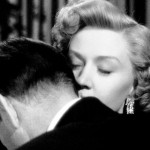“I wouldn’t want anyone but you.”
In a Lonely Place (1950) is one of those films that, by a kind of strange magic, reveals its greatness twenty or thirty minutes after it ends. There’s an honesty and emotional texture to the film that makes it really unsettling, especially given its superficial appearance as a genre picture. I say “unsettling,” of course, in the best sense of the word. Bogart’s Dixon Steele is, at first glance, a run-of-the-mill film noir anti-hero, but his performance is uncharacteristically vulnerable. Gloria Grahame’s Laurel Gray is, likewise, a fascinating meld of noir archetypes — something much more human, sympathetic, and compelling (to my mind, at least) than the Madonna or the Whore.
More than any other filmmaker, I was reminded as I watched of John Cassavetes. There’s something even in Bogart’s mannerisms here that remind me of Cassavetes, the actor. But, much more impressively, Bogart, Grahame, and Ray seem to have captured that uncanny emotional reality that makes films like A Woman Under the Influence and Faces such rich and difficult viewing experiences. In a nice bit of self-reflexivity, Dix Steele, the Hollywood sell-out desperate to write a screenplay of substance, even comments on this during a breakfast scene. When Laurel compliments him on the love scene he’s just written, Steele (speaking for Ray?) replies:
Well that’s because they’re not always telling each other how much in love they are. A good love scene should be about something else besides love. For instance, this one. Me fixing grapefruit. You sitting over there, dopey, half-asleep. Anyone looking at us could tell we’re in love.
That’s good stuff. And it works, I think, only because it’s an expression of an ideal that had already been demonstrated several times in the film itself. The scene I’ve captured in the image above, for example, doesn’t to my mind have a direct precedent in any other Hollywood film of its day. Steele and Gray are sitting at a piano bar, listening to Hadda Brooks sing “I Hadn’t Anyone Till You,” when Steele asks, “Anything you want to make you happy?” Ray cuts from a medium two-shot to a close-up of Grahame’s face buried in Bogart’s neck. What she whispers to him is less important than the unexpected moment of silent intimacy shared between these two lovers in a crowded, noisy room. That moment serves, I think, as the film’s sex scene, and it’s an incredibly moving and erotic one. The whole film is in that image — Dix bowing his head to her as a gesture of trust; Laurel closing her eyes in hope of love, then opening them to the sight of a detective entering the room.
– – –
Bonus: As soon as Bogart gave his signature line — “I was born when she kissed me. I died when she left me. I lived a few weeks while she loved me” — I found myself humming a tune. It was an hour or so later before I realized it was a song from the Smithereens album, Especially for You, a song I played ad nauseam in 1986 and 1987. Turns out the song is called, “In a Lonely Place.” Go figure. I still like it — mostly for all of the things that make it sound nothing at all like a Smithereens song: the syncopated rhythm, vibraphone, tasteful acoustic guitar, and backing vocals from Suzanne Vega.
